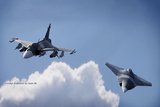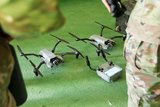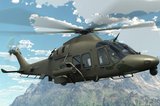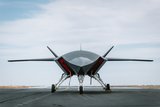Raytheon gets set for US rocket cargo missions
Raytheon BBN will develop mission planning and C2 concepts for rocket cargo applications. (Photo: US DoD)
The USAF has awarded Raytheon BBN, a subsidiary of Raytheon Intelligence & Space, a contract to develop rocket cargo mission planning and C2 systems.
The contract, announced on 17 January, has a potential value of $8.7 million over four years and is part of the air force's 2030 Science & Technology Strategy’s transformational science and technology portfolio.
During an initial 30-month period, Raytheon BBN will develop mission planning and C2 concepts, identify and develop initial rocket cargo workflows and processes and will design human-machine interfaces based on cognitive engineering.
Related Articles
Technodinamika develops satellite-guided cargo parachute
How cargo containers for UAVs can improve resupply capabilities
Northrop Grumman to fulfil full GMLRS rocket motor production
The company will also identify coordination points across mission-planning and C2 stakeholders and propose solutions to address gaps in knowledge, organisations and processes.
‘The tool we create must enable the air force to plan, coordinate and conduct a rocket cargo mission within hours,’ said Beth DePass, Raytheon BBN principal investigator for the project, in a statement.
‘At its core, this is a logistics challenge of epic proportions. Although the cargo would initially be pre-packaged and stored at the launch site for rapid loading, there are still tremendous challenges with how the DoD will safely load, launch, and deliver under very tight timing constraints,’ she continued.
‘We will be taking into consideration pre-flight testing, weather conditions, launch approvals, and many other variables, to deliver that cargo precisely where it’s needed, when it’s needed, faster than current delivery methods. We will iterate with multiple DoD stakeholders, the air force, and the space force to ensure we have the best solution to one of their greatest challenges.’
More from Air Warfare
-
![Singapore Airshow 2026: Saab eyes “share” in future fighter market, targets 2027 CCA demo flight]()
Singapore Airshow 2026: Saab eyes “share” in future fighter market, targets 2027 CCA demo flight
The Swedish government is expected to make a decision on the next steps of the Future Fighter System Concept programme by 2030, with the current second phase focusing on technology knowledge expansion and demonstration flights.
-
![Singapore Airshow: Red Cat ramps up portfolio development amid “key” APAC opportunities]()
Singapore Airshow: Red Cat ramps up portfolio development amid “key” APAC opportunities
In the wake of its 1,842% year-on-year revenue increase in Q4 2025, Red Cat sees mass opportunities in the Asia-Pacific region as the company eyes an ongoing production increase and market growth.
-
![India confronts widening military helicopter gap as border demands intensify]()
India confronts widening military helicopter gap as border demands intensify
India’s major helicopter programmes are under the spotlight as the country turns to global partners to replace legacy helicopters with growing urgency.
-
![Singapore Airshow 2026: Boeing’s MQ-28A targets key 2028 date as Block II ground tests begin]()
Singapore Airshow 2026: Boeing’s MQ-28A targets key 2028 date as Block II ground tests begin
The MQ-28A Ghost Bat is the most mature CCA platform currently under development, with Boeing looking to accelerate its timelines and development of the aircraft.
-
![Latin American air forces look beyond fighters to revamp transport aircraft fleets]()
Latin American air forces look beyond fighters to revamp transport aircraft fleets
The Mexican Air Force has become the first Latin American operator of the C-130J Super Hercules, but the service is not alone in acquiring a tactical airlifter in recent months.
-
![Singapore Airshow 2026: Embraer still sees future C-390 opportunities in region following RSAF snub]()
Singapore Airshow 2026: Embraer still sees future C-390 opportunities in region following RSAF snub
The company disclosed several defence contracts and upgrades for its defence aircraft at the show, including additional Super Tucano orders and a new C-390 Millennium customer, Uzbekistan.






















